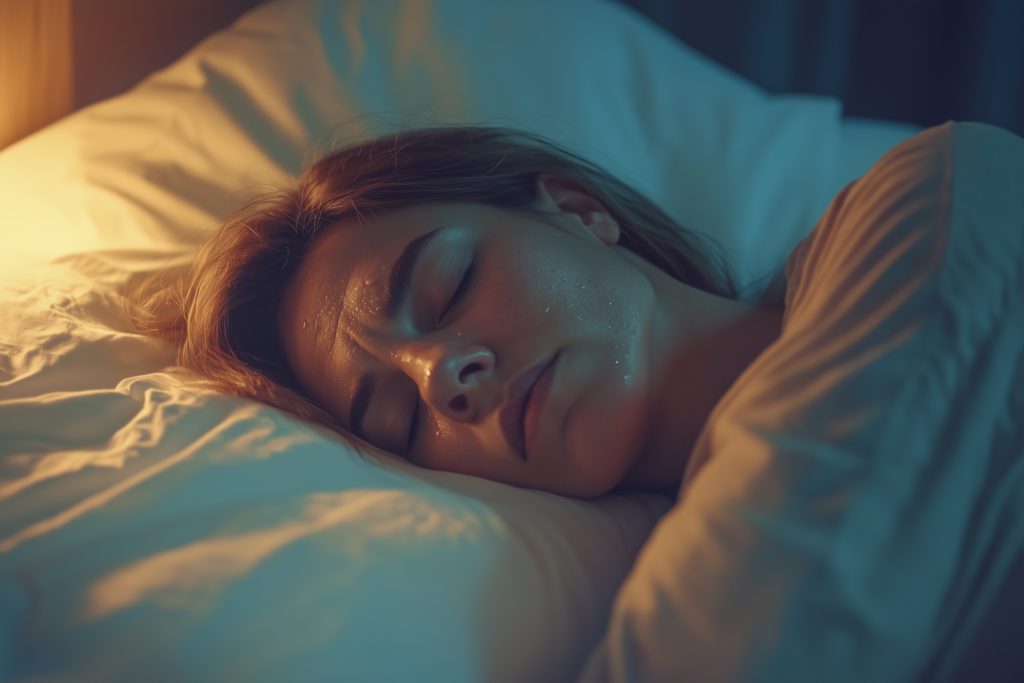
Navigating Sleep Disturbances During Menopause: Strategies for Better Rest
This article discusses menopause sleep problems and natural remedies to help you sleep. From lifestyle changes to herbal supplements, we've got you covered.

Menopause is a natural phase in a woman's life, marking the end of her menstrual cycle. While it's a time of transition, it often comes with a host of unwelcome symptoms, including sleep disturbances. The good news is you're not alone, and there are ways to deal with these challenges.
This article will discuss menopause sleep problems and natural remedies to help you rest better. From lifestyle changes to herbal supplements, we've got you covered with tips and tricks that don't involve counting sheep.
Why Are Sleep Problems Common During Menopause?
Menopause is a significant stage in a woman's life, typically occurring between the ages of 45 and 56. However, it can start earlier or later. It's officially marked by going twelve months without a menstrual period. Menopause happens because the ovaries stop producing hormones like estrogen and progesterone, which can lead to a variety of symptoms, including much-dreaded sleep disturbances.
Common menopause sleep problems include insomnia, frequent awakenings, night sweats, and hot flashes. These symptoms can make it feel like your bed has suddenly transformed into a sauna, causing significant discomfort. Beyond the obvious frustration, poor sleep during menopause can affect your overall health, mood, and daily functioning.
Understanding the link between menopause and sleep issues is the first step toward reclaiming your rest. Thankfully, natural remedies can help mitigate these problems, ensuring that you get the sleep you need to face each day refreshed and ready to go.
Natural Remedies for Menopause Sleep Problems
When it comes to tackling menopause sleep problems, natural remedies can be a real game-changer. They offer a gentle and holistic approach to managing symptoms without the need for medication. Plus, who wouldn't prefer a solution that doesn't involve adding another pill to the mix?
Natural remedies encompass a range of strategies, from lifestyle adjustments and dietary changes to herbal supplements and mind-body techniques. The goal is to create a harmonious balance in your body, helping it to cope better with the hormonal changes that menopause brings.
In the following sections, we'll explore some of these natural remedies. Whether you tweak your daily routine, incorporate certain foods and supplements, or practice relaxation techniques, there's something here that can help you achieve those coveted Zzzs. Remember, even small changes can make a big difference in your sleep quality.
Lifestyle Changes to Improve Sleep
One of the most effective ways to combat sleep problems associated with menopause is to implement lifestyle changes. Consider it as refining your daily routine to promote better sleep quality.
Firstly, regular physical activity is crucial. Exercise can help regulate your body's circadian rhythm, reduce anxiety, and improve overall well-being. Aim for at least 30 minutes of moderate exercise most days of the week. This could be anything from brisk walking to yoga. Just avoid vigorous workouts close to bedtime unless you enjoy feeling like a hyperactive hamster on a wheel.
A balanced diet also plays a vital role. Eating a variety of fruits, vegetables, lean proteins, and whole grains can help manage menopause symptoms. Try to avoid heavy meals, caffeine, and alcohol near bedtime – these can be sleep saboteurs. Think of your diet as a support system for your sleep, nourishing your body and mind.
Finally, practicing good sleep hygiene is a game-changer. This includes maintaining a regular sleep schedule, creating a restful environment (cool, dark, and quiet), and developing a calming bedtime routine. Perhaps it's time to rediscover the joy of a good book or some gentle stretches before bed.
Herbal and Dietary Supplements
For those seeking additional support, herbal and dietary supplements can be beneficial in managing menopause sleep problems naturally. These remedies can help soothe the body and promote better sleep without the side effects often associated with pharmaceuticals.
Valerian root, for example, is a popular herbal supplement known for its calming properties. It can help reduce the time it takes to fall asleep and improve sleep quality. Similarly, black cohosh is often used to alleviate hot flashes and night sweats, making those nighttime interruptions less frequent.
Dietary supplements like magnesium and melatonin are also worth considering. Magnesium helps relax muscles and supports overall nervous system health. At the same time, melatonin, a hormone that regulates sleep, can be beneficial if your sleep-wake cycle needs a little nudge.
Before adding any supplements to your routine, it's wise to consult with a healthcare professional to ensure they're appropriate for your specific needs. After all, you want these natural remedies to be your sleep allies, not adversaries.
Mind-Body Techniques
Mind-body techniques can be a powerful addition to your arsenal of natural remedies for menopause sleep problems. These practices help to calm the mind, reduce stress, and prepare the body for restful sleep. Plus, they often come with the added bonus of improved overall well-being – a win-win situation.
Yoga and meditation are two standout practices. With its gentle stretches and focus on breath, yoga can help relax both the body and mind, making it easier to drift off to sleep. Meditation, particularly mindfulness meditation, can reduce anxiety and promote a sense of calm, which is essential for good sleep.
Deep breathing exercises and progressive muscle relaxation are also effective. These techniques can help reduce the physical tension and stress that can interfere with sleep. Imagine releasing the day's worries with each exhale – it's like a mini spa session for your mind.
Incorporating these mind-body techniques into your daily routine can significantly improve your sleep quality and help you manage menopause symptoms more effectively.
If you're looking for a little extra help in tracking and improving your sleep during menopause, Pillow can be a useful companion. This sleep-tracking app provides personalized insights that can help you understand your sleep patterns better and make necessary adjustments to achieve more restful nights.
Conclusively, addressing sleep problems in menopause is crucial for overall well-being. By incorporating natural remedies and making small lifestyle changes, you can improve your sleep quality. Remember, every step you take towards better sleep is a step towards a healthier, more vibrant you.

Written by
Dr Aqsa
As a Medical Doctor, Dr Aqsa, uses her knowledge to craft complex medical information that is understandable to the general public. For years, she has tried to improve health literacy and empower readers with valuable health knowledge through her articles, blog posts, and educational materials.
Download Pillow
Get help
Press & News
Legal
Connect
X (Twitter)
Company
Copyright © Neybox Digital Ltd.



